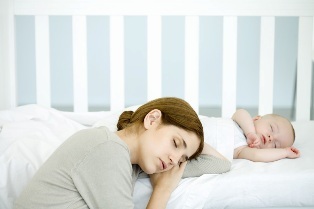Parental Tiredness
Parental Tiredness
When you have been up all night with a cranky baby, and are in desperate need of sleep, it is tempting to imagine that your baby sleeps less than anyone else’s. The sleep disruption can be frustrating, especially when other parents tell you the secret to ‘their’ well-rested nights. Advice based on poor evidence can come in all manner of well-meaning packages!
For most of us, however, coping with less sleep is something we simply get used to. We tell ourselves it will pass, and we make arrangements with our partners and other family members to care for the baby while we occasionally catch-up on some sleep.
If we are first time parents, we may have the luxury of napping during the day when the baby sleeps, and ignoring the housework.

Despite what you might be told by the parents of other babies, research studies have shown that no group of new mothers obtains more or less sleep than another group.
The comparison between mothers of babies fed human milk, and those fed infant formula are particularly subject to myths.
Sleep patterns change most dramatically for all mothers following the birth of their first baby (Sleep and depression in postpartum women: A population-based study. Dorheim et al, 2009.)— much more so than following any later births. Research also indicates that mothers perceive their own sleep to be worse according to the number of night-time wakings, rather than the total time spent caring for their baby during the night.
Maternal subjective sleep quality and nighttime infant care. Gress et al, 2010.
Studies have shown that there is no difference in the total amount of sleep mothers get based on the type of milk babies are fed. ( Infant feeding methods and maternal sleep and day-time functioning. Montgomery-Downs et al, 2010; Sleep patterns and fatigue in new mothers and fathers. Gay et al, 2004.) One recent study found that mothers who exclusively breastfeed have better quality sleep than mothers who combination feed (where baby receives both human and formula milk), and the sleep quality of exclusive breastfeeders did not differ from that of mothers who exclusively gave their babies formula milk.
Sleep and depression in postpartum women: A population-based study. Dorheim et al, 2009.
In addition, breastfeeding mothers who sleep near to their baby have been found to get more sleep and report more weeks of breastfeeding than women who breastfeed but do not sleep near to their baby.
Reasons to bed-share: why parents sleep with their infants. Ball, 2002; Breastfeeding, bed-sharing and infant sleep. Ball, 2003.
The ways in which parents organise their sleeping arrangements and night-time care plans for their baby can affect their sleep, but simply giving babies formula at night to ‘make them sleep’ does not appear to make a difference.
If one of the parents is working, research has shown that their work safety declines after their child is born. This is likely due to sleep disruption.
Click here for more detailed information on this topic.
